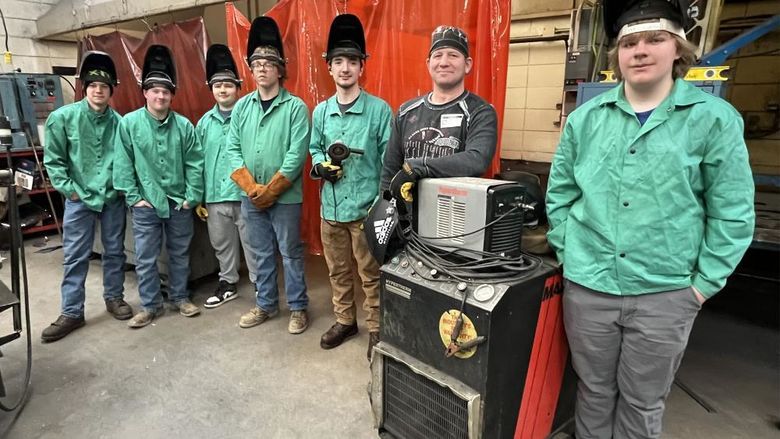Penn State DuBois and the Allegheny Mountain Section #0203 of the American Society for Quality (ASQ) are pleased to announce two major certification exam primers will be offered this spring at the campus.
The region’s manufacturers are in constant need of certified quality professionals. These classes will provide education for those preparing to take the American Society for Quality certification exams for Certified Quality Engineer (CQE) and Certified Quality Technician (CQT).
The exam primers will be offered starting in February by the Continuing and Community Education Department at Penn State DuBois. Both classes are 120 hours in length.
Participants must complete an online application and meet specific requirements from ASQ to first qualify to take these exams. Students should review these requirements on the ASQ website at www.asq.org prior to registering for one of the exam primer classes. The class fees include all course materials, including the primer binder, but do not include ASQ exam fees.
A Zoom link may also be provided to students who cannot make the classes each week due to distance or work restrictions. Students will be responsible for keeping up with the class and communicating with the instructors whenever they are unable to join the class on campus.
Instructors for these classes are local engineering and quality professionals with decades of experience in manufacturing. Because of the length of these courses, they are not offered locally on an annual basis.
According to ASQ, the Certified Quality Engineer is a professional who understands the principles of product and service quality evaluation and control. This knowledge and applied technologies include, but are not limited to, development and operation of quality control systems, application and analysis of testing and inspection procedures, and the ability to use metrology and statistical methods to diagnose and correct improper quality control practices. The CQE must also understand human factors and motivation, familiarity with quality cost concepts and techniques, and the knowledge and ability to develop and administer management information systems and to audit quality systems for deficiency identification and correction.
These are the requirements for those applying to take the Certified Quality Engineer exam:
- Candidates must have eight years of on-the-job experience in one or more of the areas of the Certified Quality Engineer Body of Knowledge. A minimum of three years of this experience must be in a decision-making position. "Decision-making" is defined as the authority to define, execute, or control projects/processes and to be responsible for the outcome. This may or may not include management or supervisory positions. Candidates must have worked in a full-time, paid role. Paid intern, co-op or any other course work cannot be applied toward the work experience requirement.
- For candidates who were certified by ASQ as a quality auditor, reliability engineer, supplier quality professional, software quality engineer or quality manager, the experience used to qualify for certification in these fields applies to certification as a quality engineer.
- Candidates who have completed a degree from a college, university or technical school with accreditation accepted by ASQ, part of the eight-year experience requirement will be waived, as follows (only one of these waivers may be claimed):
-Diploma from a technical or trade school — one year will be waived
- Associate degree — two years waived
-Bachelor’s degree — four years waived
-Master’s or doctorate — five years waived
Degrees/diplomas from educational institutions outside the United States must be equivalent to degrees from U.S. educational institutions.
Much like the Certified Quality Engineer, the Certified Quality Technician is a paraprofessional who, according to ASQ, works in support of and under the direction of quality engineers or supervisors, analyzes and solves quality problems, prepares inspection plans and instructions, selects sampling plan applications, prepares procedures, trains inspectors, performs audits, analyzes quality costs and other quality data, and applies fundamental statistical methods for process control.
Here are the requirements for those applying to take the Certified Quality Technician exam:
- Candidates must have worked in a full-time, paid role. Paid intern, co-op or any other course work cannot be applied toward the work experience requirement.
- Candidates must have at least four years of higher education and/or work experience in one or more of the areas of the Certified Quality Technician Body of Knowledge.
- Candidates who were previously certified by ASQ as a quality engineer, quality auditor, reliability engineer, software quality engineer or quality manager, experience used to qualify for certification in those fields applies to certification as a quality technician.
- Candidates who have completed a degree from a college, university or technical school with accreditation accepted by ASQ will have part of the four-year experience requirement waived, as follows (only one of these waivers may be claimed):
- Certification through the Quality Technology program of a community college or vocational
school — one year will be waived
- Associate degree — two years waived
- Bachelor's, master's, or doctorate — three years waived
Degrees or diplomas from educational institutions outside the United States must be equivalent to degrees from U.S. educational institutions.
“This is a great opportunity for anyone in the quality field to prepare for these valuable certification tests,” Janice Schatz, local ASQ Section 0203 Chair said. “Students will work directly with local professionals and peers to complete the coursework and be able to connect with a local mentor for future networking and support.”
Those wishing to learn more about ASQ can go online at www.asq.org or contact Schatz via email at [email protected]. Local membership is available for $169 per year for professionals and just $31 per year for students of an accredited university. Benefits include unlimited access to knowledge and solutions, networking opportunities, professional development and discounts on other valuable benefits. ASQ is a global organization with members in more than 130 countries. Headquartered in Milwaukee, Wisc., ASQ consists of member-led communities that help members connect with other quality professionals and practitioners, advance their knowledge and careers, and grow as thought leaders.
To find out more about the specific modules for the CQE and CQT primers being offered in DuBois, and to register for one of these trainings, log onto the Penn State DuBois web site at dubois.psu.edu/cce





